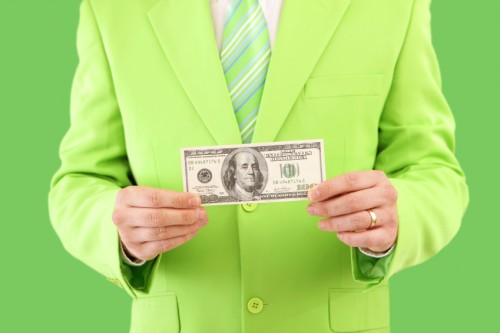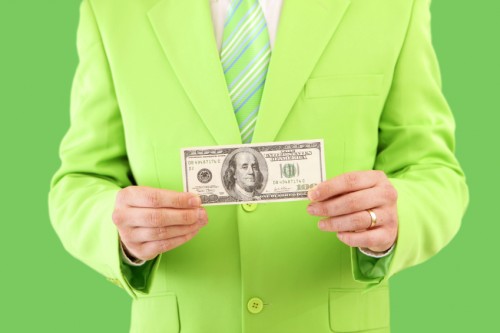 Recently, the web has been abuzz with stories about (and press releases from) companies ranked highly by the Dow Jones Sustainability Index review. The vaunted stock ticker-picker turned its eyes to green a full ten years ago to track the financial performance of “sustainability-driven companies worldwide.” Each year it releases a review of the companies in the index, using their economic, environmental, and social performance to rank them (and sometimes remove them). And the companies, in turn, use it as an excuse to make eco-happy headlines.
Recently, the web has been abuzz with stories about (and press releases from) companies ranked highly by the Dow Jones Sustainability Index review. The vaunted stock ticker-picker turned its eyes to green a full ten years ago to track the financial performance of “sustainability-driven companies worldwide.” Each year it releases a review of the companies in the index, using their economic, environmental, and social performance to rank them (and sometimes remove them). And the companies, in turn, use it as an excuse to make eco-happy headlines.
So what’s with all the hubbub? And is it important to us mere mortals, or just to companies and investors? We checked in with a couple of our favorite eco-business experts, Joel Makower of GreenBiz.com and Auden Schendler of Aspen Skiing Co., to get their take. Here’s what they had to say.
Should average consumers pay attention to the DJSI review? Why or why not?
 Makower: No. Being named to the DJSI may be a badge of honor (or seems to be, based on the stream of press releases I get from those companies), but it isn’t really a marker for “green.” DJSI refers to these as “leading sustainability-driven companies,” and there may be some truth to that, in that these are companies that stand to benefit from growing attention to energy, water, toxics, and carbon. But being named as “components” of DJSI doesn’t necessarily mean that these companies have comprehensive green policies and practices, let alone performance.
Makower: No. Being named to the DJSI may be a badge of honor (or seems to be, based on the stream of press releases I get from those companies), but it isn’t really a marker for “green.” DJSI refers to these as “leading sustainability-driven companies,” and there may be some truth to that, in that these are companies that stand to benefit from growing attention to energy, water, toxics, and carbon. But being named as “components” of DJSI doesn’t necessarily mean that these companies have comprehensive green policies and practices, let alone performance.
 Schendler: Consumers should pay attention, absolutely, because whether they admit it or not, corporations are paying attention, and are striving to get on, or advance up this list, meaning the the index is influencing practices. We badly need third-party assessments of corporate responsibility, no matter how flawed. We have never had any. We’ll improve on it eventually, but the DJSI is what’s for dinner right now, and it represents an honest effort to assess businesses
Schendler: Consumers should pay attention, absolutely, because whether they admit it or not, corporations are paying attention, and are striving to get on, or advance up this list, meaning the the index is influencing practices. We badly need third-party assessments of corporate responsibility, no matter how flawed. We have never had any. We’ll improve on it eventually, but the DJSI is what’s for dinner right now, and it represents an honest effort to assess businesses
Of the 19 companies identified as “supersector” leaders, are there any that jump out at you as particularly surprising?
Makower: I can’t claim to be fully knowledgeable about some of these companies, particularly the non-U.S. firms. In general, it’s what I’d expect from Dow Jones: a marketbasket of companies representing a range of industries and geographies. But I could have picked other companies in the same sectors. It’s all so subjective.
Schendler: When Forbes recently headlined an issue by declaring ExxonMobil a green company because it has invested in natural gas exploration, I blew spaghetti out my nose. But on this list, there weren’t companies that jumped out at me as flagrant offenders. Some jumped out as especially deserving: these include Panasonic, Swiss Re, and Roche.
When it comes to evaluating sustainability, how should one measure a company’s performance vs. its products?
Makower: It’s a big problem. Right now, there’s no standard way of assessing a company. ISO 14001 is a good standard for company performance at the facility level, but it doesn’t speak to activities at the corporate level, or any aspect of sustainability beyond environmental. The Global Reporting Initiative helps companies report their sustainability performance in a standardized way, so we can compare company to company, but it doesn’t say anything about how good companies need to be. Same with other current standards. Someday there will be a global standard for a “green” or “sustainable” company (two different things, by the way). But for now, consumers are left to their own devices.
 Schendler: There’s a hierarchy when it comes to sustainable business measures. Climate change is the issue of our time. So addressing climate with the biggest lever is by far the most important thing a corporation can do. And because our failure to solve climate and health care is fundamentally a function of the influence of corporate money on politics (politicians can’t make the right decision, they have to make the decision that keeps them in office), how businesses spend money on politics is perhaps the hallmark of how responsible they are. (If the Supreme Court allows corporate financed ads, as they well may, we can kiss our democracy goodbye.) If a business is working on its carbon footprint (good!) but not lobbying for climate policy, it’s missing the big picture. And if a business is working on factory water use but not climate, same deal. Again, this sounds harsh, but we have a climate problem first. Toxics in cosmetics is something we need to address, but it doesn’t get the same point allocation as climate action. If we don’t solve climate, we won’t be worrying about BPA in our water bottles anymore.
Schendler: There’s a hierarchy when it comes to sustainable business measures. Climate change is the issue of our time. So addressing climate with the biggest lever is by far the most important thing a corporation can do. And because our failure to solve climate and health care is fundamentally a function of the influence of corporate money on politics (politicians can’t make the right decision, they have to make the decision that keeps them in office), how businesses spend money on politics is perhaps the hallmark of how responsible they are. (If the Supreme Court allows corporate financed ads, as they well may, we can kiss our democracy goodbye.) If a business is working on its carbon footprint (good!) but not lobbying for climate policy, it’s missing the big picture. And if a business is working on factory water use but not climate, same deal. Again, this sounds harsh, but we have a climate problem first. Toxics in cosmetics is something we need to address, but it doesn’t get the same point allocation as climate action. If we don’t solve climate, we won’t be worrying about BPA in our water bottles anymore.
Along the same lines, what do you make of resulting press coverage like this: “Want an eco-friendly car? Buy a BMW!” Does it do a disservice to companies making greener products? Or does it uncover deeper, more useful information? Might it help or confuse consumers?
Makower: The mainstream media does a superb job of trivializing most environmental issues, and is particularly adept at using meaningless, hyped phrases — “Company X is going green!” (sometimes including the exclamation point). What, after all, is an eco-friendly car? Is it an electric one, or one that guzzles 20 percent less gas than it used to? The answer is probably “Yes.” Or “No.” It’s all in the eye of the beholder. Much like the DJSI companies.
Schendler: I was recently at the swimming pool talking to a friend about her family car purchase. She said: “Yeah, we heard Priuses weren’t that green — there are some issues with battery disposal. So we got a Subaru.” There’s a problem with that logic though. We don’t have a battery disposal problem, we have a climate problem. And even if we were overrun with batteries we couldn’t dispose of safely, the climate problem would still trump the battery problem. And the Prius is much better at solving climate than the Subaru. One of the issues I have with sustainability indexes in general is that, like people do, they tend to value multiple criteria equally. So BMW, not known for efficient cars, gets a good rating, presumably for some of its other practices. But those practices, while admirable, are not as important as producing an efficient fleet of vehicles. Toyota is doing that. So is Honda. Ranking BMW so highly is therefore misleading to consumers.



